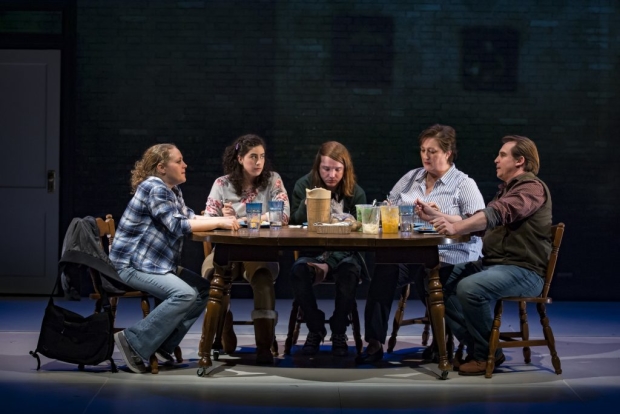An Ex-Con Rebuilds Her Life in Lettie

(© Liz Lauren)
Boo Killebrew's Lettie, being given its world premiere at Victory Gardens Theater in a production directed by its artistic director, Chay Yew, is a carefully crafted play that can at times be difficult to watch. The title character, played by Caroline Neff, is a woman who has been recently paroled after seven years in the Logan Correctional Center. She lives in a halfway house in Chicago while she trains as a welder, part of a job placement program for ex-cons. Lettie is defensive and raw, struggling against addiction, recidivism, and regrets, but she's trying like hell to stay on track for the sake of her two kids.
Lettie had her son, River (Matt Farabee), when she was just 15, and daughter, Luisa (Krystal Ortiz), a couple of years later. They've been raised by Lettie's half-sister, Carla (Kirsten Fitzgerald), and Carla's husband, Frank (Ryan Kitley), during Lettie's addiction and incarceration. Life, Lettie learns, has moved on without her. Her son and daughter have the healthy adolescence that Lettie never provided them — and never had for herself. Luisa goes by Layla now, and both kids see their aunt and uncle as their mom and dad. Lettie's long-dreamed-of family reunion turns into just another roadblock to navigate on her path to recovery.
Costumed simply in off-the-rack wares by designer Melissa Ng, the characters in Lettie inhabit a world that is grey and limiting. Andrew Boyce's set design is dominated by grey-brick, industrial-slab walls that call to mind prison cells and government housing. The industrial blankness of the back wall acts as a canvas for projection designer Stephan Mazurek's gritty, black-and-white videos, which illustrate the machinery where Lettie trains and the west side Chicago streets where her family lives.
The straightforward production design complements Killebrew's pointedly prosaic script, in which characters speak plainly or refuse to speak at all. The real pleasure in Lettie comes from watching its cast pack layers of unspoken baggage into every line. Neff is a formidable actress who excels at playing guarded, self-destructive women, and this performance is no different. Watching Neff and Fitzgerald butt heads is riveting, as they play the sisters, who share blood but little else, with equally hard-hitting candor.
Kitley is believable as the conservative factory floor manager Frank, whose love for his family shines through his stern demeanor. Despite never being quite convincing as a 14-year-old, Ortiz gives a commendable performance that captures Layla's swift transformation from eager people-pleaser to cynical teen, and Farabee is heartbreaking as the volatile, damaged River. Charin Alvarez makes an impression as Minny, who works with Lettie in the welding program. Alvarez leans into Killebrew's gallows humor with a frank self-possession that serves as a welcome contrast to Neff's wariness.
Lettie is not a play that indulges in fairy tales or unearned optimism. There are no twists and turns in this plot. After all, there are only so many paths available to Lettie. But watching an actress as talented as Neff grapple with the limitations in front of her is truly the highlight of this production.










